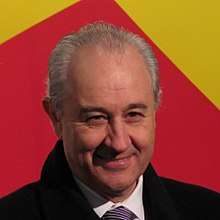Rui Rio
| Rui Rio GCIH | |
|---|---|
 | |
| President of the Social Democratic Party | |
|
Assumed office 18 February 2018 | |
| Preceded by | Pedro Passos Coelho |
| Leader of the Opposition | |
|
Assumed office 18 February 2018 | |
| Prime Minister | António Costa |
| Preceded by | Pedro Passos Coelho |
| Mayor of Porto | |
|
In office 8 January 2002 – 22 October 2013 | |
| Preceded by | Nuno Cardoso |
| Succeeded by | Rui Moreira |
| Secretary-General of the Social Democratic Party | |
|
In office 29 March 1996 – 20 June 1997 | |
| Preceded by | Eduardo Azevedo Soares |
| Succeeded by | Carlos Horta e Costa |
| Personal details | |
| Born |
Rui Fernando da Silva Rio 6 August 1957 Porto, Portugal |
| Political party | Social Democratic |
| Spouse(s) | Lídia Azevedo |
| Children | Marta |
| Education | Colégio Alemão do Porto |
| Alma mater | University of Porto |
Rui Fernando da Silva Rio, GCIH (born 6 August 1957 in Porto) is a Portuguese politician[1] and former Mayor of Porto (Presidente da Câmara Municipal). On 13 January 2018, he was elected President of the Social Democratic Party (PSD) with 54% of the votes, in which position he acts as the Leader of the Opposition.
Rio studied at the Colégio Alemão do Porto (Porto's German School), and earned his degree in economics at the University of Porto, where he was president of the Student Association, and a member of the Pedagogical Council.
Political career
Rio began his political career as part of the Juventude Social-Democrata (JSD), the Social Democrats' youth organization. He was Vice President of its National Political Commission from 1982 to 1984. At the same time he was a member of the National Political Commission of the Social Democratic Party, under Pinto Balsemão and later Mota Pinto. He was also deputy to the Assembly of the Republic, elected for the district of Porto, between 1991 and 2001. He was, during this period, the party's spokesman on economic and financial questions. He was also Secretary General of the party during the presidency of Marcelo Rebelo de Sousa Between 1996 and 1998 he was Vice President of the Instituto Sá Carneiro and, between 2002 and 2005, Vice President of the Social Democratic Party. From 2003 to 2005 he was President of the Eixo Atlântico do Noroeste Peninsular.
Mayor of Porto, 2001–2013
In 2001 Rio was elected president of the Municipal chamber of Porto, defeating Fernando Gomes in an upset. He had a troubled first term, marked by splits with the world of the football business in the city of Porto, and strong interventions in the social districts. He was re-elected by an absolute majority in 2005 and 2009. His term ended on 22 October 2013, when the new mayor Rui Moreira took office.
Leader of the PSD, 2018–present
In 2018, Rio won the race to become leader of the PSD after campaigning to hold the party on a centrist line.[2] He defeated his more conservative rival, former prime minister Pedro Santana Lopes, winning 54 percent of votes from PSD party members.
Political positions
Rio was a critic of austerity and has sought to distance himself from the tough remedies imposed by Passos Coelho in response to the eurozone economic crisis. On social issues, he is to the left of his party as a supporter of abortion, euthanasia and legalizing cannabis for medicinal purposes.[3]
Honours

_1class_BAR.svg.png)




Electoral history
PSD leadership election, 2018
| Ballot: 13 January 2018 | |||
|---|---|---|---|
| Candidate | Votes | % | |
| Source: Official results | |||
See also
References
- ↑ Giannetti, Daniela; Benoit, Kenneth (2008-12-03). Intra-party politics and coalition governments. Taylor & Francis US. pp. 70–. ISBN 978-0-415-46225-9. Retrieved 5 July 2011.
- ↑ Paul Ames (January 14, 2018), Centrist elected to lead Portugal’s opposition party Politico Europe.
- ↑ Paul Ames (January 14, 2018), Centrist elected to lead Portugal’s opposition party Politico Europe.
- ↑ "Cidadãos Nacionais Agraciados com Ordens Portuguesas". Página Oficial das Ordens Honoríficas Portuguesas. Retrieved 13 July 2016.
- 1 2 3 4 5 "Cidadãos Nacionais Agraciados com Ordens Estrangeiras". Página Oficial das Ordens Honoríficas Portuguesas. Retrieved 31 July 2017.